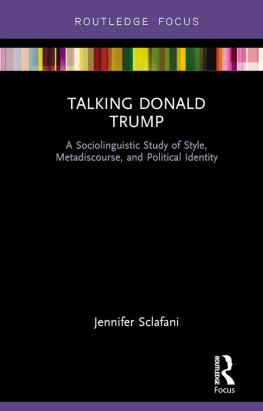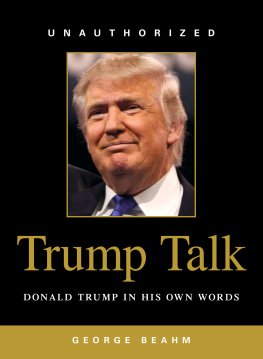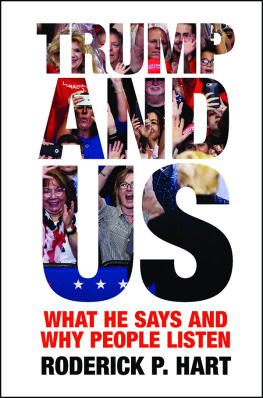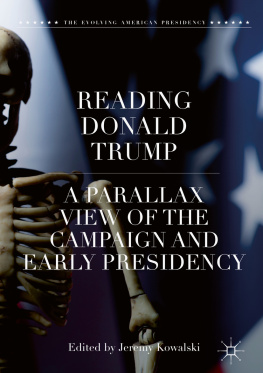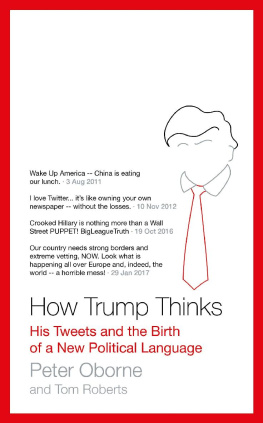Talking Donald Trump
Talking Donald Trump examines the language of Donald Trumps presidential campaign from the perspective of sociocultural linguistics. This book offers an insight into the many stages of Trumps political career, from his initial campaign for the Republican nomination, up to his presidency. Drawing from speeches, debates, and interviews, as well as parodies and public reactions to his language, Sclafani explores how Trumps language has produced such polarized reactions among the electorate. In analyzing the linguistic construction of Donald Trumps political identity, Sclafanis incisive study sheds light on the discursive construction of political identity and the conflicting language ideologies associated with the discourse of leadership in modern US society. Talking Donald Trump provides a crucial contemporary example of the interaction between sociolinguistics and political science, and is key reading for advanced students and researchers in the fields of sociolinguistics, language and politics, communication studies and rhetoric.
Jennifer Sclafani is Associate Teaching Professor of Linguistics at Georgetown University, USA. She has also been on the faculty at Hellenic American University in Athens, Greece, since 2009.
Talking Donald Trump
A Sociolinguistic Study of Style, Metadiscourse, and Political Identity
Jennifer Sclafani

First published 2018
by Routledge
2 Park Square, Milton Park, Abingdon, Oxon OX14 4RN
and by Routledge
711 Third Avenue, New York, NY 10017
Routledge is an imprint of the Taylor & Francis Group, an informa business
2018 Jennifer Sclafani
The right of Jennifer Sclafani to be identified as author of this work has been asserted by her in accordance with sections 77 and 78 of the Copyright, Designs and Patents Act 1988.
All rights reserved. No part of this book may be reprinted or reproduced or utilised in any form or by any electronic, mechanical, or other means, now known or hereafter invented, including photocopying and recording, or in any information storage or retrieval system, without permission in writing from the publishers.
Trademark notice: Product or corporate names may be trademarks or registered trademarks, and are used only for identification and explanation without intent to infringe.
British Library Cataloguing-in-Publication Data
A catalogue record for this book is available from the British Library
Library of Congress Cataloging-in-Publication Data
A catalog record for this book has been requested
ISBN: 978-1-138-24450-4 (hbk)
ISBN: 978-1-3152-7688-5 (ebk)
Typeset in Times New Roman
by Apex CoVantage, LLC
Contents
Figures
Tables
On July 21, 2016, the real estate mogul, entrepreneur, and reality television star Donald Trump received the official nomination to become the Republican Partys candidate for the 2016 US presidential election. A newcomer to the national political scene, and considered one of the most (if not the most) rhetorically unconventional, controversial, and divisive candidates in US presidential history, Mr. Trumps road to the Republican nominating convention was followed by the news media as closely as many followed his popular reality television show, The Apprentice.
Donald Trump became famous, and infamous, not so much for his political stances, which were rarely expressed in any detail during his primary campaign. It was rather how he expressed his stances linguistically that fascinated pundits and the public alike. The language of Donald Trump at the time of writing, President Trump has been the subject of much debate, both in terms of the rhetorical style in which he has delivered criticism of various individuals and groups, and what some have referred to as the candidates general oratorical lack of coherence and substance.
It is not the case that Mr. Trump was the first American presidential candidate in history to have received criticism for his oratorical skills or lack thereof. In recent presidential history, President George W. Bush became known for his folksy style and awkward diction. In fact, as Lim (2008) has documented, presidential rhetoric has been considered to be on a downhill path since the birth of the nation. However, the presidential candidacy of Donald Trump has brought studies on the declining discourse of American presidential figures into the mainstream media limelight over the past two years, and has even spurred new studies and commentary in academic and journalistic circles. Scholars of language and gender have weighed in on the sexism and misogyny (e.g., Cameron, 2016; Lakoff, 2016 [February 6]; Tannen, 2016) prevalent in his speech; others have homed in on Trumps racist discourse (e.g., Murphy, 2016; Schwartz, 2016).
However, the majority of coverage of Donald Trumps language throughout the 2016 election season, and especially during the primaries, focused less on meaning and more on the candidates lack of stylistic finesse and linguistic complexity. For example, a Boston Globe study that received a great deal of attention during the primaries performed a comparative analysis of the grade level of presidential candidates based on transcripts of their candidacy announcements and found that the complexity of Donald Trumps language equaled that of a fourth grader, earning him the lowest score of 19 Republican and Democratic candidates analyzed (Viser, 2015). The author of the study also cites other nonpartisan studies that have documented a decline in complexity in presidential speech throughout the course of history based on analyses of other types of discourse, including State of the Union speeches and congressional speeches.
It is important to point out that the Globe study employed the Flesch-Kincaid algorithm to determine the average grade-level readability of political speeches, which, when compared with other similar studies, provides us with a seemingly robust quantitative comparison of presidential rhetorical styles from both synchronic and diachronic perspectives, but leaves unexplored many of the questions that interest sociolinguists and discourse analysts when approaching questions about language use in political discourse. One of the differences in the way that sociolinguistically informed discourse analysis differs in its approach from the aforementioned studies has to do with the keen attention paid to contextual factors influencing the speech event. For instance, the Flesch-Kincaid algorithm used in the Globe study and others is a test developed to analyze the difficulty of written discourse, but it was applied to spoken speeches. A wealth of literature in sociolinguistics (see Chafe & Tannen, 1987; Chafe, 1994 for an overview) has described in great detail a number of key differences between spoken and written discourse, taking into account both cognitive and social factors. The acknowledgment of the numerous differences between spoken and written language renders any study using metrics developed to analyze written texts on spoken discourse highly problematic, especially when making claims that implicitly postulate cognitive deficiency of the speaker by comparing scores of written speech to grade-level reading development. While the deficit reading of these studies cannot be attributed to the publications themselves (i.e., the assumption that because Trump speaks at a fourth-grade reading level, he is cognitively incapable of higher order thinking), they were immediately seized upon by media outlets around the globe and were clearly interpreted through a deficit lens.

